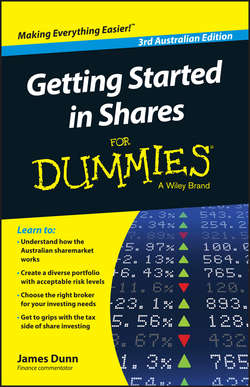Читать книгу Getting Started in Shares For Dummies Australia - Dunn James - Страница 6
На сайте Литреса книга снята с продажи.
Part I
Putting the Share in Sharemarket
Chapter 1
So, You Want to Invest in Shares
Finding Out What a Share Is
ОглавлениеCompanies divide their capital into millions (sometimes billions) of units known as shares. Each share is a unit of ownership in the company, in its assets and in its profits. Companies issue shares through the sharemarket to raise funds for their operating needs; investors buy those shares, expecting capital gains and dividends. If the company fails, a share is also an entitlement to a portion of whatever assets remain after all the company’s liabilities are paid. The following is a partial list of share definitions.
A share is
Technically a loan to a company, although the loan is never repaid. The loan is borrowed permanently – like the car keys, if you have teenagers.
A financial asset that the shareholders of a company own, as opposed to the real assets of the company – its land, buildings and the machines and equipment that its workers use to produce goods and services. Tangible assets generate income; financial assets allocate that income. When you buy a share, what you’re really buying is a share of a future flow of profits.
A right to part ownership, proportional to the amount of shares owned. In law, the part of the assets of a company owned by shareholders is called equity (the shareholders’ funds). Shares are sometimes called equities. They are also called securities because they signify ownership with certain rights.
Now you know what you’re getting when you buy shares. You become a part-owner of the company. As a shareholder, you have the right to vote on the company’s major decisions. Saying ‘I’m a part-owner of Qantas’ sounds so much more impressive than ‘I’m a Qantas Frequent Flyer member’. Just remember not to insist on sitting in with the pilots; as a shareholder, your ownership of Qantas is a bit more arm’s-length than that. That’s what shares were invented to do: Separate the ownership of the company from those who manage and run it.
Sharing the profit, not the loss
When you’re a shareholder in a company, you can sit back and watch as the company earns, hopefully, a profit on its activities. After paying the costs of doing business – raw materials, wages, interest on any loans and other items – the company distributes a portion of the profit to you and other shareholders; the rest is retained for reinvestment. This profit share is called a dividend, which is a specified amount paid every six months on each share issued by the company. Shareholders receive a dividend cheque for the total amount earned on their shareholding.
If the company makes a loss, shareholders are not required to make up the difference. All this means is they won’t receive a dividend cheque that year, unless the company dips into its reserves to pay (for more on dividends, see the section ‘Dividend income’ later in this chapter). However, if a company has too many non-profitable years it can go under, taking both its original investment and its chances of capital growth with it.
Companies that offer shares to the public are traded on the sharemarket as limited companies, which means the liability of the shareholders is limited to their original investment. This original investment is all they can lose. Suits for damages come out of shareholders’ equity, which may lower profits, but individual investors aren’t liable. Again, shareholders won’t be happy if the company continues to lose money this way.
Understanding the share in sharemarket
Shares aren’t much good to you without a market in which to trade them. The sharemarket brings together everybody who owns shares – or would like to own shares – and lets them trade among themselves. At any time, anybody with money can buy some shares.
The sharemarket is a matchmaker for money and shares. If you want to buy some shares, you place a buying order on the market and wait for someone to sell you the amount you want. If you want to sell, you put your shares up for sale and wait for interested buyers to beat a path to your door.
The trouble with the matchmaker analogy is that some people really do fall in love with their shares. (I talk about this more in Chapter 7.) Just as in real love, their feelings can blind them to the imperfections of the loved one.
Investors are wise to remember that their shares are assets that are meant to do a job: To make money for the investors and their families. Making money is what the right shares do, given time.
Because shares are revalued constantly, the total value of a portfolio of shares, which is a collection of shares in different companies, fluctuates from day to day. Some days the portfolio loses value. But over time, a good share portfolio shrugs off the volatility in prices and begins to create wealth for its owner. The more time you give the sharemarket to perform this task, the more wealth the sharemarket can create.
